Every year, Thanksgiving at my house is the same: Try to cram a huge turkey, a ton of side dishes and a few too many cooks in the kitchen. It’s practically a recipe for a hilarious holiday rom-com! To make things easier this year, I’m skipping the oven-roasted turkey and perfecting my technique for how to deep-fry a turkey instead. Frying a turkey not only frees up space in the oven, but it might also save my sanity.
You’ve probably heard of deep-frying turkey before but maybe haven’t dared to try it. Once you learn how to deep-fry a turkey, you’ll find it’s not as scary as you thought. It’s one the easiest (and quickest) ways to cook a turkey. It only requires attention to a few details and some safety precautions.
Get our complete Thanksgiving turkey guide for more tips and tricks.
Safety Tips for Frying Turkey
Deep-fried turkey is downright delicious, but we can’t overstress that the process is not without risk. We don’t want to scare you, but as a former restaurant chef, I know first-hand that fryer oil burns fast and hot. Before you decide to fire up the deep-fryer, make sure you’re ready to be safe and responsible. That means no drinking and frying.
If you’re new to this cooking method, start by checking out beginner’s deep-frying guide. Then, read the manufacturer’s manual that came with your deep fryer (yes, the whole thing). It’s also a good idea to become familiar with the cooking process before getting started. That way, you’ll fully understand every step before jumping in.
From there, it’s all about observing a few safety tips.
- Never use a turkey fryer inside, and make sure it’s set up on a flat surface (such as concrete) in an open area. It’s important to place the fryer on level ground.
- Make sure the set-up allows plenty of space to walk around the fryer. No one should need to walk between the propane tank and the burner. If anyone trips over the hose, it could cause the pot of hot oil to fall over.
- Position the fryer at least 10 feet away from your house, garage or any other buildings. It should not be located near combustible materials, such as wooden decks, structures or furniture.
- Have a fire extinguisher on hand. Hopefully, you won’t need it! But you can’t douse a grease fire with water, so have that extinguisher ready (just in case).
- Measure the oil level ahead of time to prevent overflowing the pot. We have step-by-step instructions on how to do this in the recipe below.
- If you’re new to frying, you can start by heating the oil to a low temp of 275°F. Then, turn the heat up after you add the bird. This keeps the oil from splattering like high-temperature methods, which is safer and easier for beginners.
Before You Start
How big of a turkey do I need?
There is a size limit on deep-fried turkey. A standard 30-quart pot can only handle a 14-pound turkey (or smaller). If your turkey is larger, you’ll need to remove the legs and thighs from the body and fry them separately. Don’t be afraid to ask your local butcher to help you with that.
What kind of marinade or rub should I use?
Taste of Home’s senior food stylist, Shannon Norris, advises that moisture is not your friend when deep-frying. She recommends using a dry brine or spice rub. If you season the turkey the day before, it will absorb the flavors overnight as it sits in the fridge. Just make sure you don’t rinse off the seasoning, or you’ll add the water we’re trying to avoid.
What type of oil do you use?
There are several oils to choose from when deep-frying. Look for a neutral oil with a high smoke point, like peanut oil, canola oil, vegetable oil, safflower oil or rice bran oil.
How do I prep the bird?
You don’t need to truss the entire bird when deep-frying, but you will want to tuck the wings behind the turkey and tie the legs together to promote even cooking. Butterball also recommends standing the seasoned bird in a tube pan overnight in the refrigerator. That allows excess water to drip out off the bird, ensuring the cavity is nice and dry.
How to Make a Deep-Fried Turkey
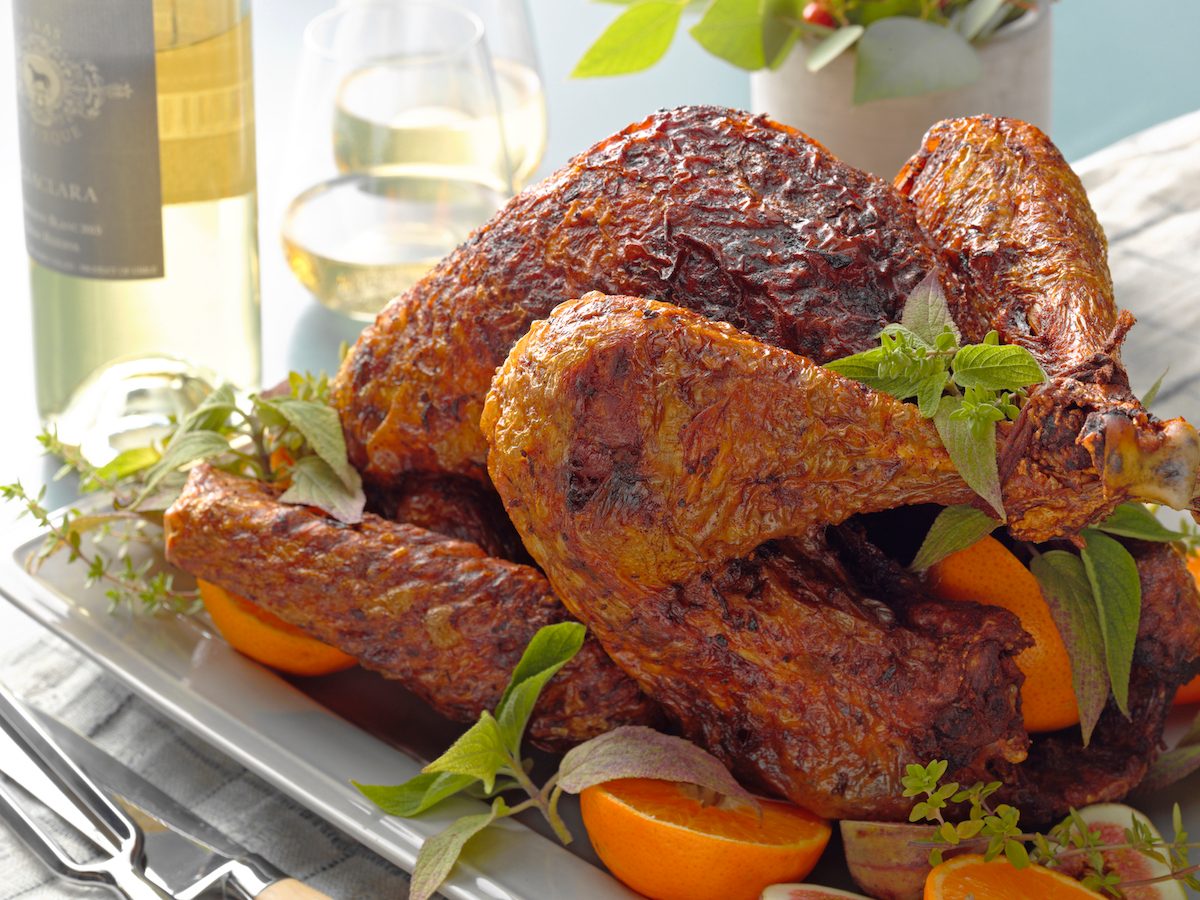
Ingredients
- 1 turkey (10 to 12 pounds)
- 2 tablespoons minced fresh thyme
- 4 teaspoons kosher salt
- 1 tablespoon sugar
- 1 tablespoon garlic powder
- 1 tablespoon paprika
- 1 tablespoon coarsely ground pepper
- Oil for deep-fat frying (It should be about 3-1/2 gallons.)
Yield: 16 servings
Tools You Need
- It’s best to buy a kit that contains everything you need for a successful run, like the RiverGrille 30 Qt. Turkey Fryer Package. It includes an outdoor burner, a 30-quart pot, a deep-frying thermometer to monitor oil temperature and a rack with a hook to slow lower the turkey into the oil. Once you have it on hand, you can use it throughout the year for seafood boils, brewing beer and other large projects. Our Test Kitchen also recommends the King Kooker 29 Qt. Turkey Fryer Package.
- Heat-resistant gloves are the best way to protect your arms from hot oil splatter. Look for a pair that’s heat-proof, waterproof and grease-proof. If they come up to your elbow, even better.
- If you don’t have one already, an instant-read meat thermometer is essential for knowing when the turkey is finished cooking.
- Pick up a fire extinguisher that’s rated to work with grease fires.
Directions
Step 1: Choose your location and measure the oil
Once you’ve chosen the location for your turkey fryer—outside on level ground, and at least 10 feet away from structures or combustible materials—it’s time to measure the oil. Overflowing the pot is the number one most dangerous aspect of deep-frying a turkey. There’s no way to fix things once the oil is heated, so you’ll want to pre-measure the oil line.
- Place your turkey in the pot and add water until it’s covered by about a half an inch.
- Remove the turkey and allow any excess water to drain back into the pot.
- Measure the remaining water, or mark the waterline as the maximum fill line before discarding the water. Make sure there is at least three to five inches from the fill line to the top of the pot to prevent a boilover.
It should end up somewhere around 3.5 gallons. You’ll also want to be sure you don’t overfill the manufacturer’s fill line. If that’s the case, you’ll need to deconstruct the turkey before frying it.
Step 2: Prepare the turkey
We generally avoid using traditional brines when deep-frying turkey to minimize the splatter factor. Oil and water don’t mix, and hot oil will spit when it encounters water droplets. Since brine introduces extra liquid, we prefer using a dry brine. This method also dries out the turkey skin as it sits uncovered in the fridge overnight to help the bird crisp up in the fryer.
In a small bowl, combine the thyme, salt, sugar, garlic powder, paprika and ground pepper. Using your fingers, carefully loosen the skin from the turkey. Rub the salt mixture under the skin, inside the cavity and over the outside. Tuck the wings under the turkey and tie the drumsticks together using kitchen twine. Refrigerate for 18 to 24 hours, uncovered.
Step 3: Preheat the oil and dry the turkey
Once you’re ready to fry, fully dry the inside and outside of the pot. Fill it with oil, being careful not to exceed the maximum fill line. Clip a deep-frying thermometer onto the side of the pot and turn on the burner. Preheat the oil to 275°F.
While the oil is preheating, remove the turkey from the fridge and let it stand at room temperature. Pat the turkey dry inside and out, making sure no liquid or ice is lingering inside the cavity.
Step 4: Slowly lower the turkey into the fryer
When the oil is preheated, turn the burner on high until you reach 350°F (or 325°F if you’re cooking turkey parts). Adjust the heat to maintain that temperature.
Place the turkey, breast side down, on the deep frying rack. If the rack comes with a detachable hook, make sure it’s hooked well. You should be able to hold the turkey securely over the cutting board without it slipping or falling.
Slowly and carefully lower the turkey into the hot oil, going slow enough to prevent the oil from bubbling over. Easing it in nice and slowly also allows you the chance to abort if anything goes amiss.
Editor’s Tip: You should definitely be wearing heat-resistant gloves for this step, along with pants and shoes. This isn’t the best activity for shorts and sandals! You want as little exposed skin as possible to reduce your chances of getting burned.
Step 5: Set a timer
Deep-fried turkey cooks very quickly: About 35 to 45 minutes (or three to four minutes per pound). Set a timer accordingly, and carefully lift the turkey out of the oil when it goes off. Take the temperature with an instant-read meat thermometer. The deepest part of the thigh should register 170°F to 175°F. If it’s not finished, lower the turkey back into the oil and continue cooking.
Step 8: Let Rest
When the turkey reaches the proper temperature, remove it from the oil. Place it on a rimmed baking sheet fitted with a wire rack to let the excess oil drain. Tent it with foil and let it rest for at least 20 minutes before carving. Resting meat keeps it juicy, so don’t slice too soon.

Serving Deep-Fried Turkey
After the turkey has rested for at least 20 minutes, follow our guide for carving the turkey. The skin will be crispier than a regular turkey, so make sure your carving knives are plenty sharp. Present the turkey on a platter with the legs and wings left whole. The breast and thighs are easier to serve when cut into 1/4-inch thick slices.
Sides to Pair with Deep-Fried Turkey
Any sides you enjoy with oven-roasted turkey will pair well with deep-fried turkey. You may find you have more freedom when choosing the right side dishes with the oven freed up! Although deep-fried turkey usually turns out juicier and moister than other cooking methods, you can’t go wrong by serving it with Grandma’s best gravy.

Herb-Glazed Turkey
Honey and corn syrup blend with savory herbs and seasonings to give this turkey a slightly sweet flavor. My tried-and-true recipe never fails to win me compliments. —Charlene Melenka, Vegreville, Alberta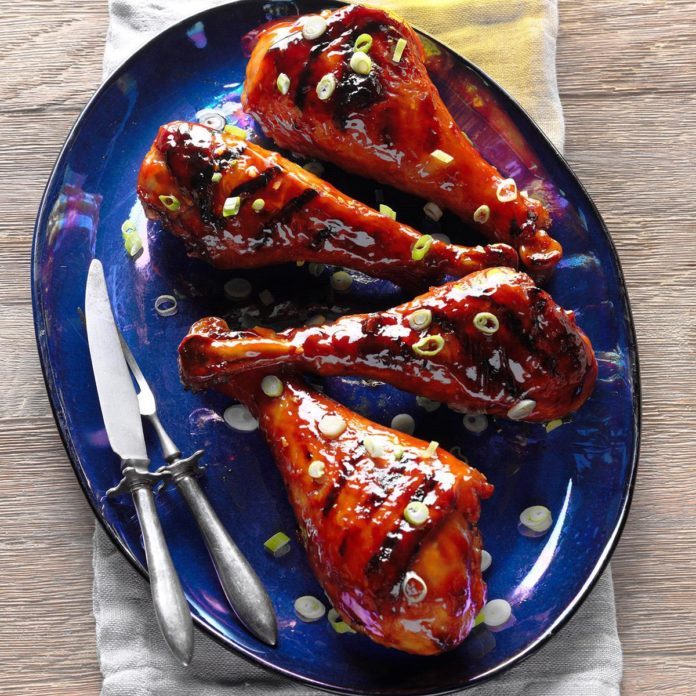
Grilled Huli Huli Turkey Drumsticks
I'm never one to do things traditionally, so when it came time to hosting Thanksgiving, I went in a completely tropical direction. Borrowing my favorite Hawaiian chicken recipe, I substituted turkey legs and have never looked back. —Jacyn Siebert, San Francisco, California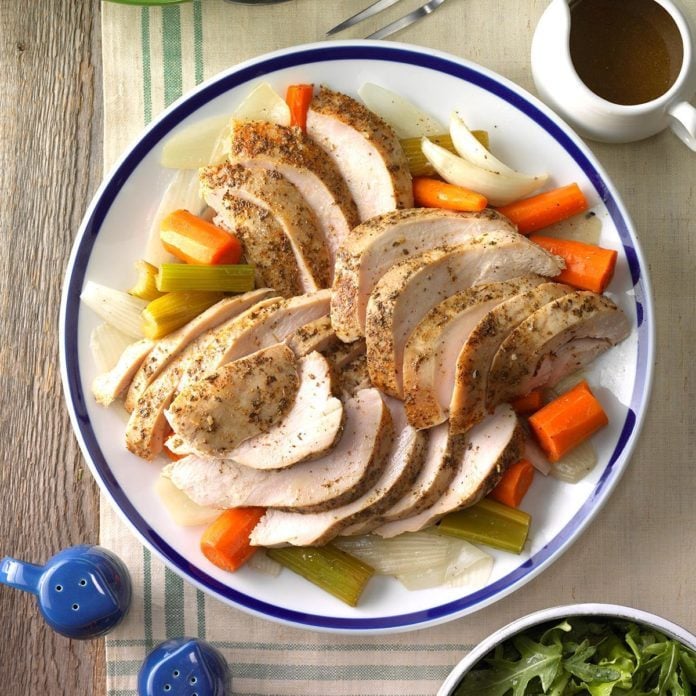
Pressure Cooker Italian Turkey Breast
This recipe makes some of the most succulent turkey I've ever eaten. High in lean protein, it’s a smart entree for a special occasion. —Jessica Kunz, Springfield, Illinois
Apple-Sage Roasted Turkey
A hint of apple flavor gives a slightly sweet spin to a holiday dinner’s main event. The lovely aroma wafting from your kitchen as this turkey cooks will have everybody talking. —Suzy Horvath, Milwaukie, Oregon
Turkey Lattice Pie
With its pretty lattice crust, this cheesy baked dish looks as good as it tastes. It's easy to make, too, since it uses ready-to-go crescent roll dough. —Lorraine Naig, Emmetsburg, Iowa
Herbed Roast Turkey Breast
When learning how to cook turkey breast for my first formal dinner party as a newlywed, I came across this particular recipe. It was such a success that this turkey breast recipe has become a standby on all my entertaining menus. —Lisa Mahon Fluegeman, Cincinnati, Ohio
Romano Basil Turkey Breast
Guests will be impressed when you slice this golden, grilled turkey breast, dressed up with a flavorful layer of basil and cheese under the skin. —Darlene Markham, Rochester, New York
Mediterranean Turkey Potpies
Your clan will love these wonderful, stick-to-the-ribs potpies with a Mediterranean twist. I always use the leftovers from our big holiday turkey to prepare this recipe. I think my family enjoys the potpies more than the original feast! —Marie Rizzio, Interlochen, Michigan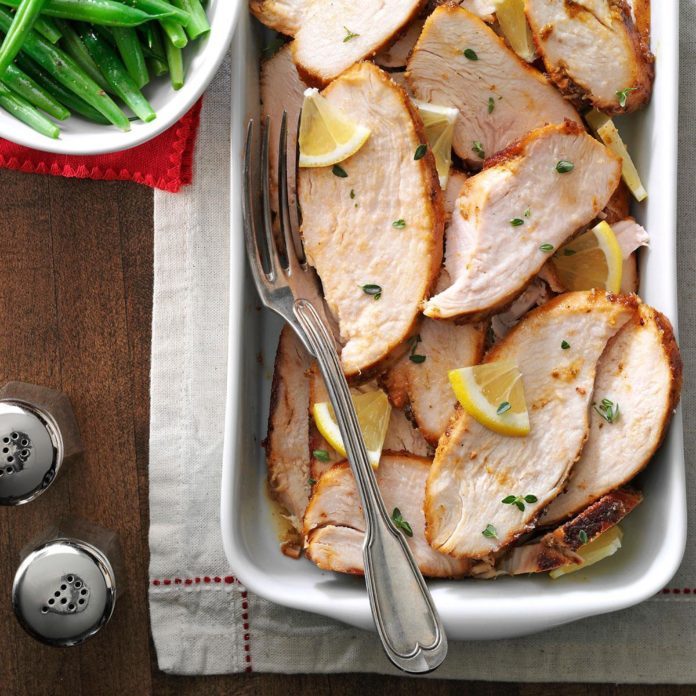
Pressure-Cooker Herbed Turkey Breasts
Tender turkey breast is enhanced with an array of flavorful herbs in this juicy, comforting dish. —Laurie Mace, Los Osos, California
Turkey Breast Tenderloins with Raspberry Sauce
Sweet and tangy raspberry sauce is a perfect complement to versatile turkey tenderloins. In fact, the sauce is so good, you’ll be tempted to eat it with a spoon.—Deirdre Cox, Kansas City, Missouri
Slow-Cooked Turkey with Herbed Stuffing
I'm all for turkey dinner, especially around the holidays. A whole turkey won't fit in my slow cooker, so thank goodness for turkey breast. I cook it with my grandma's easy stuffing recipe for a happy meal that doesn't require any hard work. —Camille Beckstrand, Layton, Utah
Turkey Bundles
This recipe is definitely a must-try, and all you do is bundle up creamy turkey filling in crescent dough. I usually double the recipe so I have extra for lunch the next day. —Lydia Garrod, Tacoma, Washington
Butter & Herb Turkey
My kids love a turkey meal, and this one falls off the bone. It's the ideal recipe for special family times and holidays. —Rochelle Popovic, South Bend, Indiana
Peppery Herbed Turkey Tenderloin
I won the North Carolina Turkey Cook-Off one year with these full-flavored tenderloins in rich sauce. Marinating the turkey in wine, garlic, rosemary and thyme gives it a fantastic taste. —Virginia Anthony, Jacksonville, Florida
Roasted Sage Turkey with Vegetable Gravy
There’s no prep like home-style when roasting the big bird. Instead of sage stuffing with turkey, fill this bird with fresh sage and thyme sprigs for the same delicious flavors. —Beth Jacobson, Milwaukee, Wisconsin
Spatchcocked Herb-Roasted Turkey
This moist and tender turkey cooks up with even browning and crispy skin in half the time of a whole turkey. —Matthew Hass, Ellison Bay, Wisconsin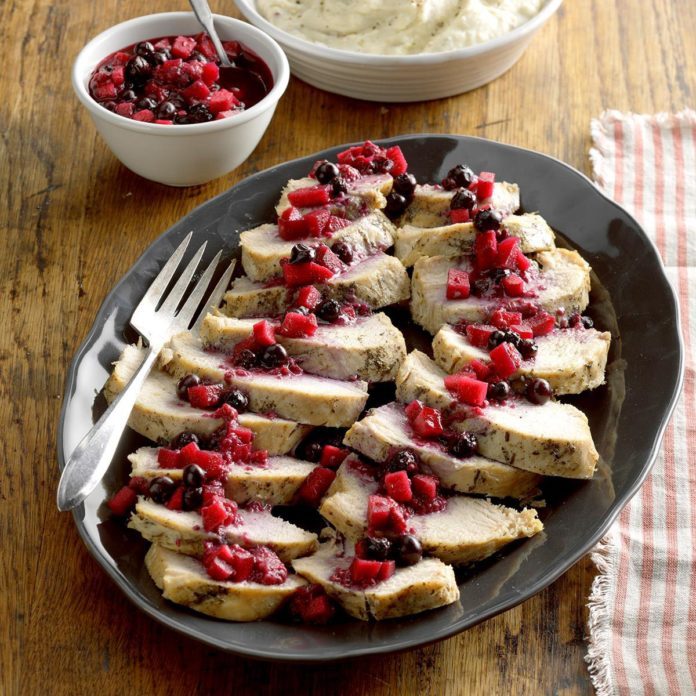
Pressure-Cooker Turkey with Berry Compote
This delicious dish gives you a way to get all that yummy turkey flavor without heating up the house, and the berries make the perfect summer sauce. For a browner turkey, just broil it for a few minutes before serving. —Margaret Bracher, Robertsdale, Alabama
Turkey Cutlets with Pan Gravy
Using cutlets or any boneless meat speeds up cooking time for this quick entree. You can use thin boneless, skinless chicken breast as well. —Margaret Wilson, Sun City, California
Creole Roasted Turkey with Holy Trinity Stuffing
I jazz up turkey Creole style with the trinity of onions, bell peppers and celery—plus a stuffing that gets hotter and hotter the longer it sits. —Eric Olsson, Macomb, Michigan
Turkey Biscuit Stew
This chunky stew makes a hearty supper, especially in the fall and winter. It'salso a great way to use extra turkey during the holidays. —Lori Schlecht, Wimbledon, North Dakota
Thanksgiving Stuffed Turkey
I've tried fancy stuffing recipes for our holiday bird, but none hits the spot like my mother's simple mixture of bread, eggs and caramelized vegetables. Have it on any holiday. —Lily Julow, Lawrenceville, Georgia
Maple-Sage Brined Turkey
When the leaves start turning, it’s turkey time at our house. We use maple-sage brine to help brown the bird and make the meat incredibly juicy. —Kim Forni, Laconia, New Hampshire
Slow-Cooked Herbed Turkey
When herbs are plentiful in my garden, I prepare this turkey recipe. The turkey stays moist in the slow cooker and is bursting with herb flavors. When I served this to our Bible study potluck group, everyone wanted the recipe! —Sue Jurack, Mequon, Wisconsin
Turkey Cordon Bleu Casserole
Impress your holiday visitors with this fancier twist on the traditional casserole. —Kristine Blauert, Wabasha, Minnesota
Rosemary Turkey Breast
I season turkey with a blend of rosemary, garlic and paprika. Because I rub half of the mixture directly on the meat under the skin, I can remove the skin before serving and not lose any of the flavor. The result is an entree that’s lower in fat, yet delicious—the perfect centerpiece for holiday meals. —Dorothy Pritchett, Wills Point, Texas
Happy Orange Turkey
Here’s the perfect centerpiece for your Thanksgiving feast. Champagne and oranges flavor this special bird that will become one of your favorite turkey recipes ever. —Tara Baier, Menomonie, Wisconsin
Golden Apricot-Glazed Turkey Breast
Basted with a simple glaze, this wonderfully moist and tender turkey bakes to a lovely golden brown. Make it the centerpiece of your holiday table; guests will be glad you did. —Greg Fontenot, The Woodlands, Texas
Turkey & Spinach Stuffing Casserole
I know dried cranberries may seem like an odd ingredient to include in this dish, but they add just a hint of sweetness that makes an easy casserole so special. —Gilda Lester, Millsboro, Delaware
Thyme Roasted Turkey
It's easy for flavors to get lost when using too many seasonings together. When in doubt, a simple combination of butter and fresh thyme captures the essence of Thanksgiving for a classic turkey dinner. —Alma Winberry, Great Falls, Montana
Make-Ahead Turkey and Gravy
Ease the holiday time crunch with a make-ahead turkey recipe that's ready to serve when you are. It's a great choice for potlucks, too. —Marie Parker, Milwaukee, Wisconsin
Stuffed Turkey with Mojo Sauce
I love Latin food so I created this recipe that combines wonderful spices and fresh ingredients. This is a traditional turkey recipe with a healthier twist because it uses chicken sausage instead of chorizo. —Melissa Lauer, San Antonio, Texas
Turkey Dumpling Stew
My mom made this stew when I was young, and it was always a hit. Since it's not time-consuming to make I can fix it on a weekend for our children, who love the tender dumplings. —Becky Mohr, Appleton, Wisconsin
Marinated Thanksgiving Turkey
My family enjoys this Thanksgiving turkey because it cooks up tender, tasty and golden brown. Build up flavor by marinating the meat, then grill it to add a tempting barbecued flavor. —Ken Churches, Kailua-Kona, Hawaii
Moist & Tender Turkey Breast
This easy turkey recipe is sure to be popular in your home. Everyone will love the taste, and you'll love how quickly it comes together. —Heidi Vawdrey, Riverton, Utah
Roasted Turkey with Maple Cranberry Glaze
I prepare turkey with a taste of Canada in mind. The sweet maple flavor comes through even in the breast meat. You may start to notice it's caramelized color after about 2 hours. That's when I cover it loosely with foil while it finishes cooking. The meat will stay tender and juicy. —Suzanne Anctil, West Vancouver, British Columbia
Minestrone with Turkey
I remember my mom making this soup; now I make it for my kids as often as I can. It's a good way to use up leftover vegetables. Sometimes I add a can of rinsed and drained kidney or garbanzo beans. —Angela Goodman, Kaneohe, Hawaii
Turkey in a Pot
I use this recipe often as an easy Sunday dinner idea. The turkey breast gets a "holiday treatment" when served with cranberry gravy seasoned with cinnamon, cloves and allspice. —Lois Woodward, Okeechobee, Florida
Fruit-Glazed Roast Turkey
Apple, cranberry and raspberry flavors blend with fresh herbs in a tangy glaze for the roasted turkey. It's a welcome change to a traditional entree. —Aysha Schurman, Ammon, Idaho
Slow-Cooker Turkey Breast with Gravy
This quick-prep recipe lets you feast on turkey at any time of year. We save the rich broth for gravy, noodles and soup making. —Joyce Hough, Annapolis, Maryland
Turkey-Stuffed Acorn Squash
We stuff acorn squash with leftovers like turkey, dressing and cranberry sauce. Make as much or as little as you need to use everything up. —Cindy Romberg, Mississauga, Ontario
Citrus & Herb Roasted Turkey Breast
This recipe will make you love turkey again. Brining with lemon, rosemary and orange juice makes it so moist and flavorful. It's the star attraction at our table. —Fay Moreland, Wichita Falls, Texas
Thanksgiving Stuffed Shells
Leftover turkey, dressing and sweet potatoes make terrific stuffing for jumbo pasta shells. We add cheese and use turkey gravy as the sauce for this crowd-pleaser. —Robin Haas, Cranston, Rhode Island
Honey-Citrus Glazed Turkey
A turkey breast is enough for us, but you can roast a whole bird if you're feeding a big group. Either way, this super-succulent turkey wins the day. —Peter Halferty, Corpus Christi, Texas
Spiced & Grilled Turkey
My fiance loves to grill, so for the holidays we decided to grill our turkey instead of deep frying it. It was the best we'd ever tasted! Having the brine in the pan under the turkey catches the drippings, but also keeps everything nice and moist. Start with the breast down, then flip to the other side. —Sydney Botelho, Columbia, South Carolina
Creamy Turkey Casserole
I sometimes make turkey just so I have the extras for the casserole! —Mary Jo O'Brien, Hastings, MinnesotaThe post How to Deep-Fry a Turkey appeared first on Taste of Home.
Lindsay D. Mattison



